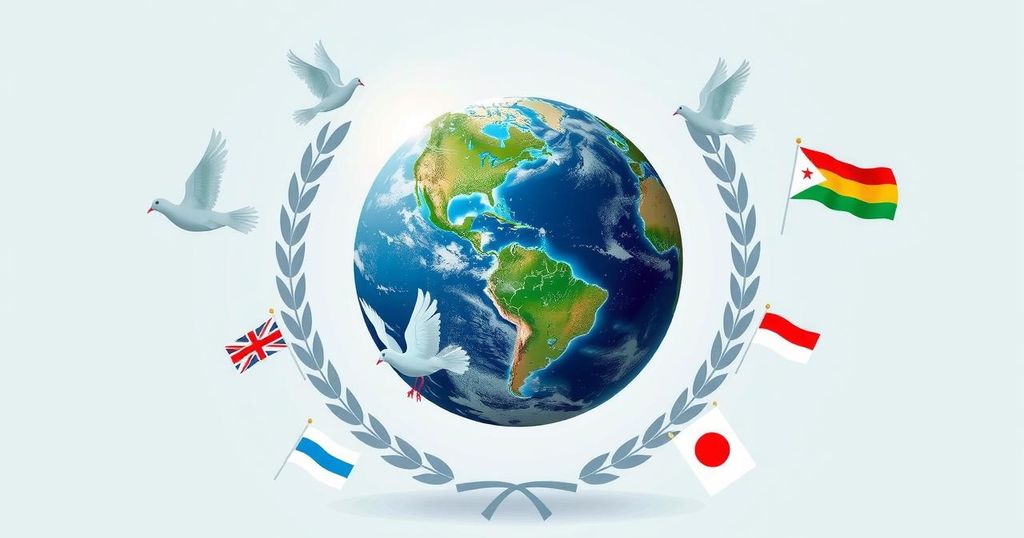Trump Explores Sending U.S. Inmates to El Salvador as Legal Battles Loom

President Trump addressed foreign policy during a flight back to Washington, discussing potential deportations to El Salvador, ongoing wars in Ukraine and Gaza, and the impact of recent tariffs on the U.S. economy. He expressed openness to sending U.S. inmates to El Salvador and emphasized the need for peace and negotiations in conflict areas.
In recent remarks aboard Air Force One, President Donald Trump addressed various pressing foreign policy issues while returning to Washington. Among these discussions are the administration’s strategies to resolve ongoing wars in Ukraine and Gaza and the significant backlash concerning newly enacted tariffs. On the same day, President Trump met with Israeli Prime Minister Benjamin Netanyahu to deliberate on tariffs and ceasefire negotiations.
The Trump administration’s stringent approach to illegal immigration, notably concerning gang members, has gained attention. The deportation of a Maryland resident to a notorious super-prison in El Salvador has sparked legal battles, alongside a Supreme Court directive to expedite deportations under an 18th-century wartime law.
During this discourse, President Trump expressed his willingness to enhance collaboration with Salvadoran President Nayib Bukele, asserting his openness to sending even more individuals, including American citizens, to El Salvador’s penal facilities. Trump stated, “I love that… I’m all for it. If they can house these horrible criminals for a lot less money than it costs us, I’m all for it.”
Bukele’s cooperation has been essential for Trump’s deportation initiatives, particularly under the Alien Enemies Act of 1798. This law is currently under scrutiny by the Supreme Court following a judge’s nationwide pause directive concerning its application for deportations. The case of Abrego Garcia, a Salvadoran national, remains contentious after he was sent to prison due to an alleged administrative mistake.
Trump emphasized the dichotomy of gang affiliations, noting, “Somebody said he’s a member of MS-13… he should immediately be brought back. MS-13 is just as bad as Tren de Aragua.” As the situation develops, the administration contends that Garcia is a member of MS-13, while defense attorneys contest this assertion.
In addition to immigration discussions, Trump reiterated the need for a resolution to the prolonged conflict between Russia and Ukraine, expressing disapproval of ongoing bombings that claim numerous lives. He remarked, “We’d like them to stop. I don’t like the bombing… a horrible thing that should have never started.” Trump has alluded to Russian President Vladimir Putin’s purported stalling tactics during peace negotiations.
Ahead of Netanyahu’s visit, Trump highlighted the necessity of discussing trade relations and the urgency of establishing a lasting ceasefire amid renewed violence in Gaza. Netanyahu’s trip marks his second journey to the U.S. since Trump’s return to office this year, coinciding with the implementation of sweeping tariffs that have instigated market declines and recession concerns.
As violence escalates in Gaza, the White House has expressed approval of Israel’s renewed offensive while maintaining pressure for a sustainable peace agreement. Trump remarked on historical relations in the Middle East, asserting, “We had no problem with the Middle East. Everything was done… Now they have a lot of money. So, we’ll see what happens.”
In summary, President Trump’s recent comments indicate a multifaceted approach to international relations, highlighting issues such as immigration reform through potential cooperative deportations with El Salvador and the need for conflict resolution in Ukraine and Gaza. The administration grapples with legal battles and international negotiations while navigating criticisms over domestic tariffs. Trump’s willingness to discuss and pursue diplomatic ties underscores his commitment to enhancing foreign cooperation.
Original Source: komonews.com







